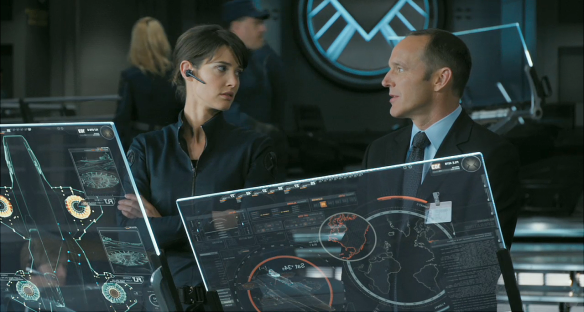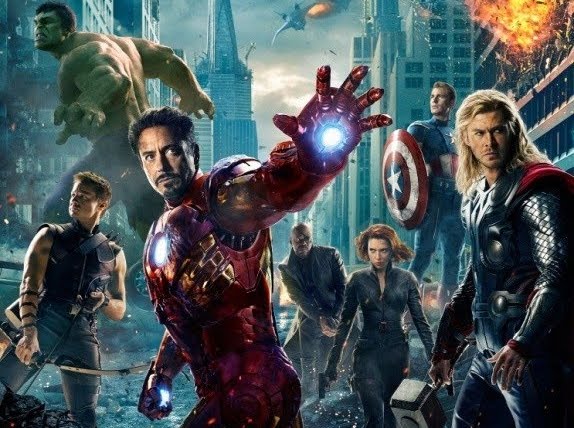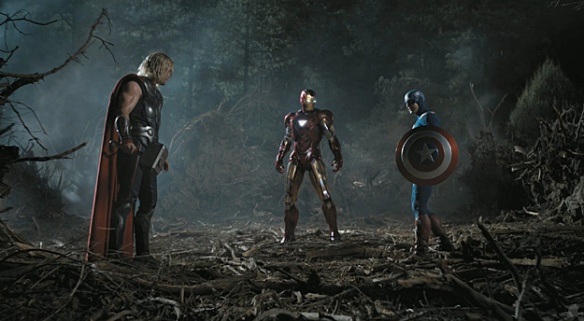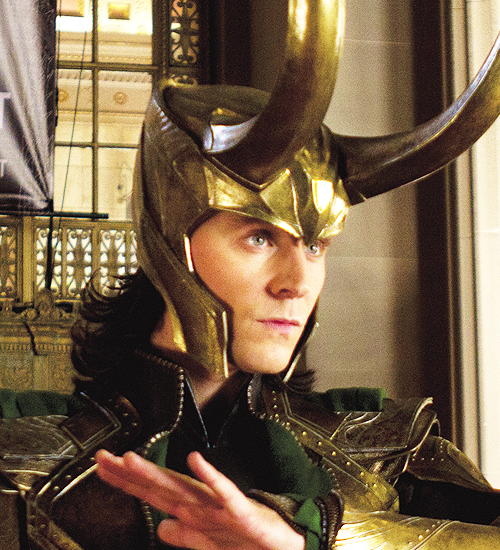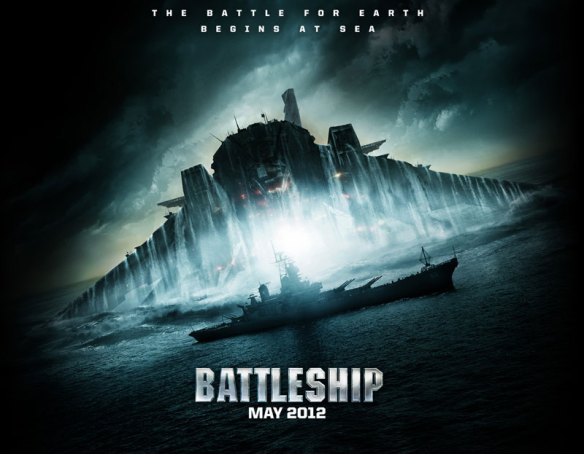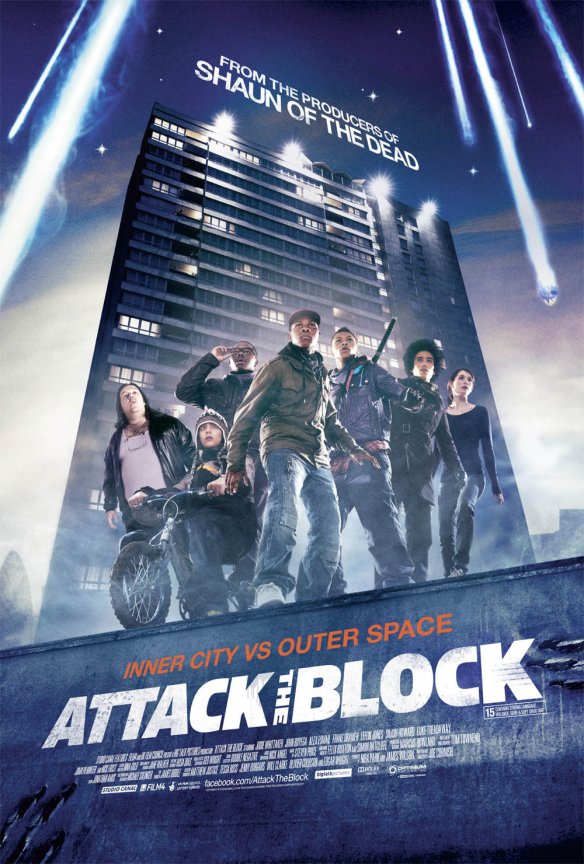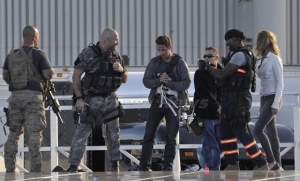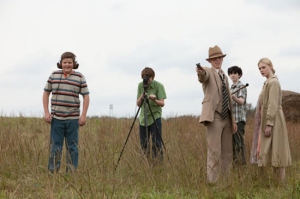My initial reaction when the credits rolled on this movie, (which I saw in a packed theater opening night), was, “meh, it was interesting, not great, maybe a good discussion starter.” Considering it is now four 10 days later and I am still busily dissecting the symbolism, having in-depth discussions and arguments over it with my friends, and breaking my never-read-other-people’s-reviews-until-you-have-written-yours rule, I think I have to amend my initial rating. Yes, it is a great movie, and totally worth seeing (for those of-age and not too squeamish). Not because the script is flawless, (it’s not), not because the visuals are cool, (they are), but because it does spark conversations, and hopefully some of them revolve around the same question the characters in the film seem to be asking: what is the meaning of life? What is the significance of discovering humanity’s origin? What is the relationship between a Creator/s and his/their creation?
I felt that most of these questions were unanswered, or were unsatisfactorily dealt with, (which may be in part because this film is the first of a planned trilogy), but at least they are being asked. Prometheus certainly has the potential to provide a basis for a deep discussion, even if it isn’t very deep itself.
 As I said, I am still digesting this particular movie. (Hey, that’s the name of the blog!) I fully intend to see it at least one more time in the theater, maybe more. So perhaps I will come back and edit this post with more insights later. Here are some of my thoughts and reactions for now. Be warned, **SPOILERS AHEAD**.
As I said, I am still digesting this particular movie. (Hey, that’s the name of the blog!) I fully intend to see it at least one more time in the theater, maybe more. So perhaps I will come back and edit this post with more insights later. Here are some of my thoughts and reactions for now. Be warned, **SPOILERS AHEAD**.
A major theme in this movie is finding the meaning and purpose by discovering the “truth” of one’s origins. Scientist Elizabeth Shaw becomes convinced through a series of ancient cave-paintings that “I think they want us to come and find them.” Who are “they”, you ask? “We call them Engineers…they engineered us,” she says. When a skeptical crew member aboard the spaceship asks how she knows this, she responds, “I don’t. But it’s what I choose to believe.” (I’m not sure whether that shows a strong example of faith or a poor excuse for a lack of sound theology. I think that, yes, in the end, you have to have faith, because you’re never going to be able to find scientific answers to all of theology’s questions. But that doesn’t mean you shouldn’t have good reasons for choosing to believe. **see update below**)
In any case, finding the answers to the origin, and therefore the meaning, of life, is what motivates Shaw and her partner on this mission. (The rest of the crew have their own motives, mostly monetary). It is assumed that the two quests go hand in hand, and that one informs the other. It is assumed that the answers are critically important, enough to travel light-years into space to find. I certainly won’t argue with that. It’s the same assumptions that people make every time the debate about what to teach in schools regarding Evolution flares up.
Humans aren’t he only ones seeking to uncover the meaning of their existence. David, (an android played by Michael Fassbender and arguably the most compelling character in the film), knows that he was manufactured by his master Weyland. But he still wants to know “why.” And though dialogue repeatedly states that as a robot he has no emotions and cannot understand the human condition, this desire for purpose and a personal connection with his creator makes him appear exactly as human as everyone else, despite his precise and calculating movements. (This artificial-intelligence-appears-fully-human-and-seeks-to-meet-creator theme echoes that of Blade Runner, also a film by Ridley Scott; I think this shows the self-proclaimed agnostic director is himself seeking answers.)
Seeking answers is what many characters in Prometheus proclaim they are doing, but as the movie demonstrates, just answering where we came from is unsatisfying. When the team finds proof of alien life, but the aliens are all dead, Charlie (Shaw’s partner) reels into a drunken depression. Finding supposed proof validating his theory on the origin of life on earth is almost meaningless, because “I wanted to talk to them,” he says. He didn’t just want answers about his creation, he wanted a relationship with his creator.
This reminds me of Ecclesiastes 3:9-11, which states,
What does the worker gain from his toil? I have seen the burden God has laid on men. He has made everything beautiful in its time. He has also set eternity in the hearts of men; yet they cannot fathom what God has done from beginning to end.
Part of the ‘burden’ of being human is continually desiring to know more. We spend our whole lives trying to figure out the meaning of life. We’re unsatisfied with the day-to-day and the evil realities of our world. We want to know that our lives have purpose and understand where we fit into the grand scheme of eternity. We want to know the reason we are here. We want to know there is a reason. The good news for seekers is that God has said,
You will seek me and find me when you seek me with all your heart. –Jeremiah 29:13
The sentiment is echoed in numerous places throughout scripture. In Prometheus, Shaw certainly seems to be seeking the truth with all of her heart. It remains to be seen whether the planned trilogy will show her finding it, but our Creator has promised us we can find Him, even without stepping foot on a spaceship. If we seek Him with all our heart.

Scientist seeking answers, Elizabeth Shaw, played by Noomi Rapace.
Questions that I am still puzzling over: What was David’s motivation for poisoning Charlie? Did he realize it would kill him, and was seeking revenge for Charlie’s dismissing and jerk-like behavior towards him, or was he just emotionless-ly curious as to what exactly would happen? DID David in fact have feelings? (Seems like the answer is an obvious yes, but, is that too easy?) If wanting to find out what your creator’s purpose was for you is what makes us human, isn’t David one of the most human characters in this film? Why was the captain so disinterested in doing his actual job? (Not a serious question, more of an annoyance with the script). What did David actually say to the Engineer at the end? (A discussion among linguists about this is over at the Language Log). Does Shaw really “deserve to know why” the Engineers changed their minds about supporting the existence of humanity? I mean, do created beings have a right to demand answers from their Creator like that? Did all the people God wiped out in the Flood “deserve to know why”?
Other people’s thoughts: this livejournal entry by cavalorn* has been getting a lot of attention and there is a lively discussion in the comments. He points out a self-sacrificing-to-create-life versus sacrificing-others-to-self-preserve motif, identifies re-contextualization of religious imagery (particularly the virgin birth) and theorizes that the Engineers decided to wipe out humanity because Jesus was one of them, (a space alien,) and humans killed him. This is a mostly negative review that points out flaws in the script, and pretty much sums up how I felt right after I saw the movie. And elsewhere someone has compiled a list of unanswered questions at the close of the film.
*When I have more time I would like to come back and add my thoughts on cavalorn’s theory. Particularly the bit about Jesus being a space alien, and what the theological implications of that would be.
**update**
Suppose that we did travel to a distant planet and discover humanoid remains that shared our DNA. What would that really mean for traditional Christian theology? In the movie Prometheus, several characters assume that finding intelligent alien life automatically verifies the theory that life on earth was seeded by aliens, and discredits the Biblical creation account. But I see no reason why that would have to be the case. Like Shaw, who does not lose her faith in the existence of God when she discovers the aliens that Charlie asserts “made us,” but instead asks “and who made them?”, I would not cease to believe the Bible just because we came across an unexpected situation that scripture did not specifically speak to.
If there were life on another planet, I would assume that it had also been created by God. It goes back to the very first verse in the Bible,
In the beginning God created the heavens and the earth. -Genesis 1:1
I take that phrase “heavens and earth” to include everything in the universe. On day four in the Genesis 1 creation account, God creates “lights in the expanse of the sky to separate the day from the night, and let them serve as signs to mark seasons and days and years,” (Genesis 1:14), which again I would take to include not only sun, moon, and stars but other planets as well. The creator’s domain doesn’t end with our atmosphere; if he made everything in the universe, then any life out there was also made by him. If there were intelligent life on another planet, the tricky question would be whether or not those “people” were governed by the same laws of sin and redemption that bind the descendants of Adam and Eve.
For since death came through a man, the resurrection of the dead comes also through a man. For as in Adam all die, so in Christ all will be made alive. -1 Corinthians 15:21-22
If humanoid aliens that shared DNA with earth humans were discovered, it would be possible that they were originally from earth and developed space travel and planet colonization in an ancient civilization. In that case, they would be descendants of Adam just like we are, born into a sinful state and in need of redemption through Jesus’ sacrifice. If they weren’t human, if they originated from some other planet entirely, well then I’m not sure what their relationship to sin and redemption would be. Perhaps God would have a different method of salvation set up for them–as there was a different method on this earth, before Jesus, through animal sacrifice. Perhaps it’s possible that in a parallel universe, God created an alien race that is living in an unfallen state, but scripture indicates that all life in this universe feels the destructive effects of humanity’s sin:
The creation waits in eager expectation for the sons of God to be revealed. For the creation was subjected to frustration, not by its own choice, but by the will of the one who subjected it, in hope that the creation itself will be liberated from its bondage to decay and brought into the glorious freedom of the children of God. We know that the whole creation has been groaning as in the pains of childbirth right up to the present time. -Romans 8:19-22
Finding intelligent alien life would be fascinating and unexpected, but it in itself would not be enough to destroy the theological premise of Christianity. Now, if, as the narrative in the film Prometheus reveals, an alien life really did seed life on this planet, and Jesus was nothing more than an alien envoy, then yes, that would pretty much destroy the validity of everything that I believe in. The literal death and resurrection by the Son of God is crucial, and without it, Christianity is meaningless. Paul says so exactly in 1 Corinthians 15, (although I doubt he ever imagined his words would be used to answer a hypothetical question about aliens!) This is a long passage to quote, but I think it’s all relevant and important. Without Christ’s resurrection, there is no hope for us. If Jesus was just a space alien killed by an angry mob, then I might react like Charlie does and just start drinking and wallowing in self-pity, too, (emphasis added):
Now, brothers and sisters, I want to remind you of the gospel I preached to you, which you received and on which you have taken your stand. 2 By this gospel you are saved, if you hold firmly to the word I preached to you. Otherwise, you have believed in vain.
3 For what I received I passed on to you as of first importance: that Christ died for our sins according to the Scriptures, 4 that he was buried, that he was raised on the third day according to the Scriptures, 5 and that he appeared to Cephas, and then to the Twelve. 6 After that, he appeared to more than five hundred of the brothers and sisters at the same time, most of whom are still living, though some have fallen asleep. 7 Then he appeared to James, then to all the apostles, 8 and last of all he appeared to me also, as to one abnormally born.
9 For I am the least of the apostles and do not even deserve to be called an apostle, because I persecuted the church of God. 10 But by the grace of God I am what I am, and his grace to me was not without effect. No, I worked harder than all of them—yet not I, but the grace of God that was with me. 11 Whether, then, it is I or they, this is what we preach, and this is what you believed.
12 But if it is preached that Christ has been raised from the dead, how can some of you say that there is no resurrection of the dead? 13 If there is no resurrection of the dead, then not even Christ has been raised. 14 And if Christ has not been raised, our preaching is useless and so is your faith. 15 More than that, we are then found to be false witnesses about God, for we have testified about God that he raised Christ from the dead. But he did not raise him if in fact the dead are not raised. 16 For if the dead are not raised, then Christ has not been raised either. 17 And if Christ has not been raised, your faith is futile; you are still in your sins. 18 Then those also who have fallen asleep in Christ are lost. 19 If only for this life we have hope in Christ, we are of all people most to be pitied. –1 Corinthians 15:1-19
Having thought about this film for several months now, I think that I do like Elizabeth Shaw’s line, when asked how she knows her belief is correct, “I don’t. But it’s what I choose to believe.” Choosing to believe something won’t make it true, and there are a lot of good reasons beyond blind faith to believe that what the scriptures reveal is the truth–philosophical, theological, historical, archaeological, biological, scholarly reasons. But in the end, belief in the truth of scripture is a matter of faith. We will never be able to “prove” its claims using the scientific method. I have a lot of reasonable arguments behind why I believe the Bible is a true and reliable source, but in the end, it is a choice that I make to believe, in the absence of hard evidence.
I have to reiterate, Prometheus, while definitely not a perfect film, is one of the most thought-provoking movies I’ve seen in quite a while. It grapples with big questions and is almost certain to spark debates over cosmic questions amongst viewers. It is well worth watching and discussing afterwards, and I hope that this rather disjointed post is a helpful part of that discussion for Christians and seekers alike.
